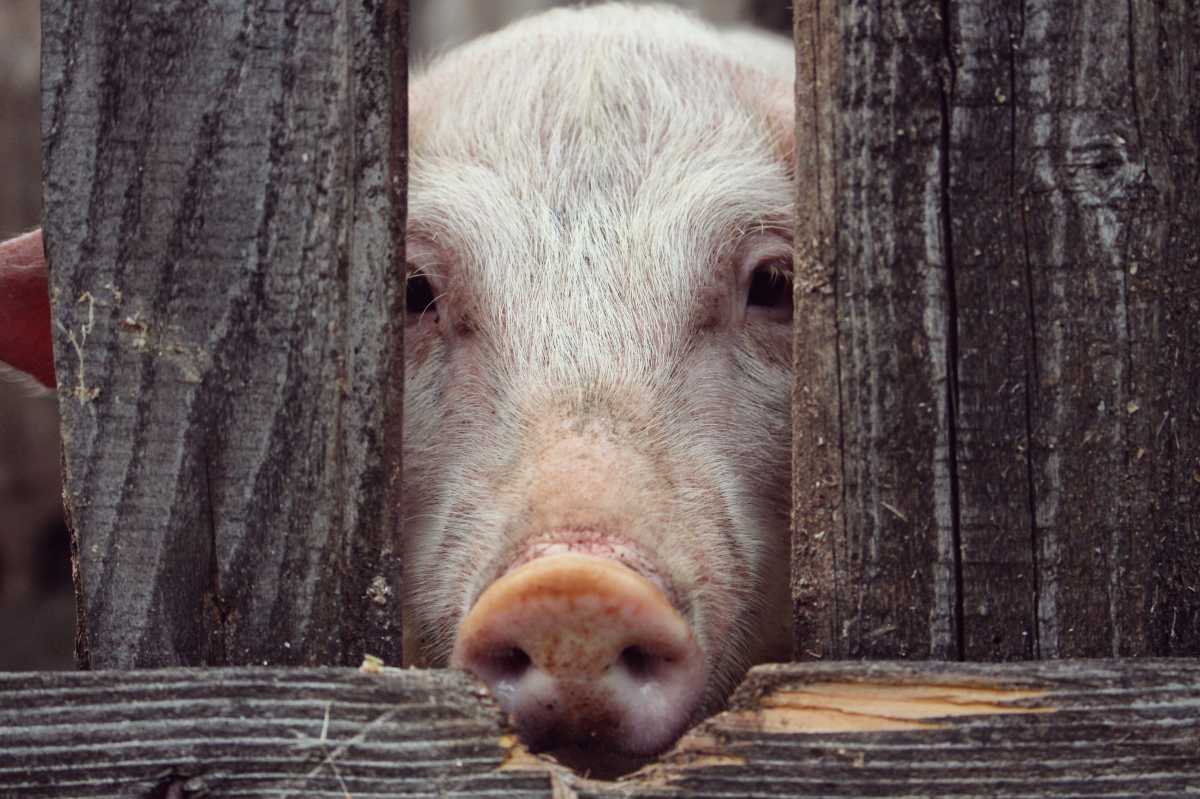Picture a pig slumped in the mud, unable to muster the energy to eat or play. This heartbreaking sight is a sign of depression in pigs, an often-overlooked condition.
Learn more about the signs of a depressed pig, from behavioral changes to physical symptoms, and find out how you can help.
Key Takeaways
- Look for signs of fear, such as cowering, hiding, and trembling
- Pay attention to changes in sleeping and eating habits
- Notice if the pig becomes more aggressive or withdrawn
- Take the pig to the vet to ensure physical health
Understanding Pig Depression: An Overview
Gaining an understanding of pig depression is key to recognizing its signs. Pigs are highly intelligent, social animals who need attention, stimulation, and healthy relationships with other pigs and humans alike. They can suffer from noise sensitivity, seasonal affective disorder, hormone imbalances, and other emotional problems.
Signs of depression can include changes in behavior, such as loss of appetite, lack of interest in interacting with others, and a general lack of energy. Pigs can also exhibit decreased vocalizations, including their signature pig laughter, and may refuse to move from their bedding needs.
To ensure your pig is healthy and happy, look for signs of depression and provide them with a suitable and enriched environment.
Recognizing Behavioral Changes in Depressed Pigs
By recognizing behavioral changes in your pig, you can identify signs of depression and take steps to help them. Look for signs of fear in their reactions, such as cowering, hiding, and trembling. These can be triggered by environmental stressors or lack of mental stimulation.
Also, pay attention to changes in their sleeping and eating habits and if they become more aggressive or withdrawn from you. If you notice these behaviors, take your pig to the vet to ensure their health is okay.
To help your pig, ensure plenty of environmental enrichment and positive reinforcement. You can help your pig find peace and happiness again with veterinary care and proper mental stimulation.
Physical Symptoms of a Depressed Pig
It’s necessary to be aware of physical symptoms in your pig that may indicate depression. Some of these symptoms include loss of appetite, weight loss, and lethargy. Weight loss can signify depression, as a pig may not feel hungry or lose their appetite. Lethargy can manifest in a pig not wanting to get up or do anything; they may appear sluggish or less active than usual.
Other physical signs include aggression, sleep disturbances, and poor hygiene. Aggression can also be a sign, as a depressed pig may become irritable and reactive to environmental changes. Sleep disturbances can also be a physical sign of depression, as depressed pigs may sleep more or less than usual. Poor hygiene can indicate that your pig isn’t feeling well; for example, they may feel down if they neglect their hygiene.
It’s essential to watch for any physical changes in your pig that may be signs of depression.
Social Interactions: How Depressed Pigs Interact Differently
You may notice that your pig interacts differently when depressed; they may become less social and avoid social interactions. This could mean they become withdrawn, spending less time with other pigs or even avoiding activities they usually enjoy.
It’s important to help your pig by providing companionship and reducing stress. You can do this by avoiding isolation and providing stimulation. This could include creating a routine and playing with your pig.
Improving their companionship will help them to cope better with their depression and have a more positive outlook. Make sure to spend quality time with your pig and show them you care. This will help them to feel more loved and connected.
The Impact of Environment on Pig Depression
When depression affects your pig, its environment is often a major contributing factor. It’s important to recognize and address any changes in their surroundings. Overcrowding, isolation stress, sound sensitivity, and psychological trauma can all lead to depression in pigs.
Environmental enrichment can be very beneficial in treating depression in pigs. This includes providing plenty of space, natural light, and stimulating activities. Pigs are naturally social creatures, so giving them access to other pigs can help keep them mentally healthy.
Another critical aspect to consider is sound levels in their environment. Some pigs can be sensitive to loud noises, so it’s crucial to be mindful of this.
If your pig is showing signs of depression, such as decreased appetite, lethargy, or aggression, taking steps to improve their environment may help alleviate their symptoms.
The Effects of Diet on Depressed Pigs
You can help your depressed pig by ensuring they’re eating a balanced, nutritious diet regularly. Diet modifications can help improve their mental state and reduce symptoms of depression. Providing adequate nutrition gives them the energy to engage in limited exercise, mental stimulation, and social interaction.
Changes to their diet should be accompanied by environmental changes as well. For example, enrichment activities and stimulating toys can help improve their mood. In addition, making sure they’ve plenty of social interaction with their owners and other pigs can help keep them from feeling lonely and isolated.
All these measures can help keep your pig from becoming depressed in the first place or help them cope with their current depression.
How to Aid a Pig Showing Signs of Depression
If you notice your pig exhibiting signs of depression, you must take action to aid them. Positive reinforcement, mental stimulation, environmental enrichment, and socialization activities help them cope with depression.
You can offer treats when your pig does something positive and encourage them with verbal praise. Giving them mental stimulation through puzzles and activities can also help.
Providing environmental enrichment by giving your pig access to different areas with different textures and scents can help, too. Finally, participating in socialization activities with your pig can help them to form positive relationships and reduce stress.
With these strategies, you can help your pig to feel more comfortable and less depressed.
Preventing Depression in Pigs: Helpful Strategies
With proper care and attention, you can help prevent depression in your pig by engaging in activities that promote positive reinforcement, mental stimulation, environmental enrichment, and socialization.
Consider providing your pig with plenty of emotional support and social interaction. For example, you can create opportunities for your pig to engage in positive reinforcement activities, such as playing games that reward them with treats or setting up an area to explore and play.
Additionally, give your pig plenty of mental stimulation and environmental enrichment by providing toys and activities to keep them engaged and active. Show your pig that you care and offer them affection through cuddles and belly rubs.
If you have more than one pig, foster positive social relationships between them.
Frequently Asked Questions
What Medications Can Be Used to Treat Depression in Pigs?
Dealing with a depressed pig may seem daunting, but there are steps you can take to help ensure your pet is healthy and happy.
Diagnosis methods such as blood tests or physical exams are important to rule out underlying medical conditions.
Stress management techniques, environmental enrichment, diet changes, and behavior modification are all viable solutions.
Additionally, medications such as anti-depressants and anti-anxiety drugs can be prescribed by a veterinarian to help your pig cope with depression.
Being compassionate and patient with your pig during this time is crucial.
With the proper care, your pig will be feeling better soon.
Is It Possible to Reverse the Effects of Depression in Pigs?
Yes, it’s possible to reverse the effects of depression in pigs. Medications can be prescribed to help, but it’s important to consider any potential side effects and adjust the dosage as needed.
Additionally, environmental stressors should be addressed, such as noise levels, overcrowding, and lack of stimulation. Socialization strategies, diet modifications, and regular exercise routines can also play a critical role in helping a pig overcome their depression.
With a combination of these treatments, it’s possible to reverse the effects of depression in pigs.
How Long Can a Pig Live With Depression?
Have you ever wondered how long a pig can live with depression?
The truth is that the length of time a pig can live with depression depends on its socializing patterns, environmental changes, diet modifications, emotional triggers, and behavioral cues.
For instance, if a pig lives in a stressful environment with limited access to social interaction, its depression symptoms may appear very quickly and last for an extended period. On the other hand, if a pig is provided with opportunities to socialize, its depression symptoms may improve over time.
Additionally, diet modifications, environmental changes, and emotional triggers can all help reduce the effects of depression in pigs.
In short, the length of time a pig can live with depression will depend on its circumstances.
How Does a Pig’s Age Affect Their Risk of Depression?
The age of a pig can affect their risk of depression in several ways. Environmental triggers such as changes in diet or a lack of social support can increase the risk of depression in older pigs. Additionally, pigs may be more susceptible to emotional stressors as they age.
To reduce the risk of depression, pigs of all ages should receive adequate social support, a well-balanced diet, and access to coping mechanisms.
What Lifestyle Changes Can Be Implemented to Help Prevent Depression in Pigs?
You can help prevent depression in pigs by making a few lifestyle changes.
Invite your pig to socialize with its peers and provide a carefully controlled diet.
Stimulate its environment with plenty of exercise and mental stimulation.
Picture your pig as a living, breathing creature with its own needs and emotions.
Metaphorically speaking, it’s like giving your pet a breath of fresh air.
You can help your pig stay healthy and happy with the right lifestyle changes.
Conclusion
Depression in pigs can have serious consequences, but there is hope with proper care and understanding.
From recognizing the signs to providing a supportive environment, diet, and social connections, you can help your pig find the peace and joy it deserves.
With compassion and knowledge, you can make a difference in the life of a depressed pig.

